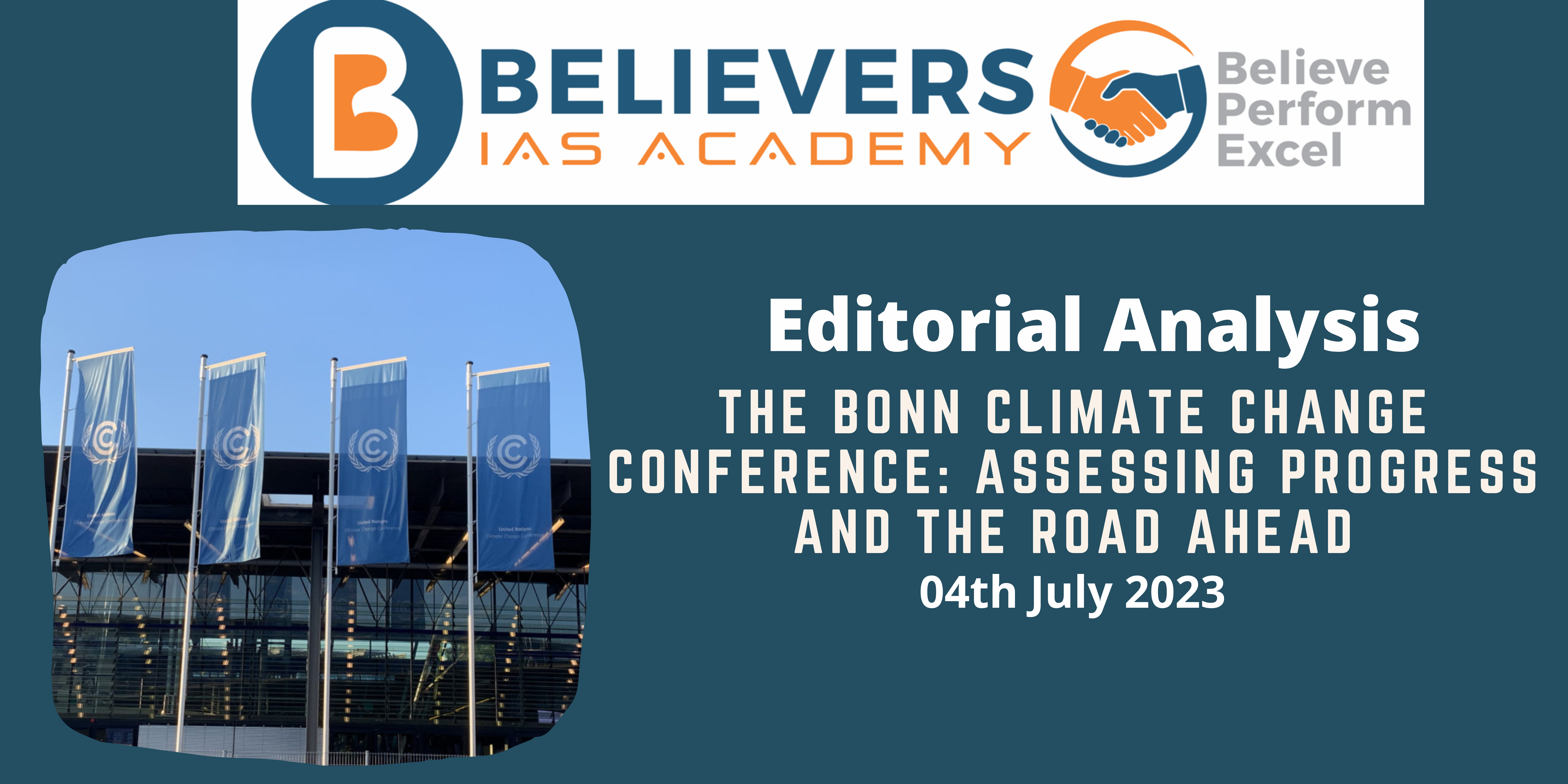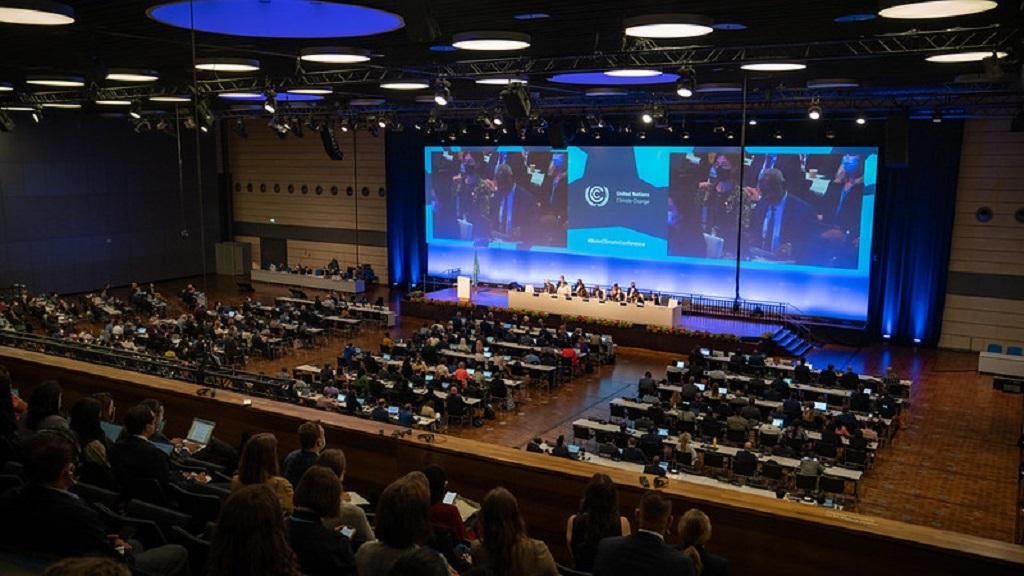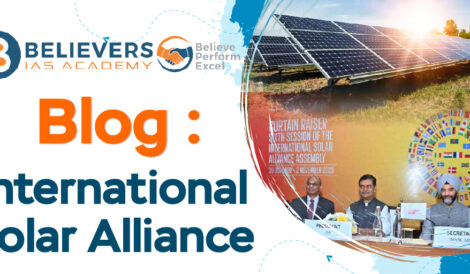The Bonn Climate Change Conference: Assessing Progress and the Road Ahead
Context:
The Bonn Climate Change Conference marked a significant milestone in climate negotiations, setting the stage for the first Global Stocktake under the Paris Agreement at COP28.
Relevance:
GS-02, GS-03 (Important International Institutions) (Conservation)
Prelims:
- Bonn Climate meet
- Paris Agreement
- COP 28
- UNFCCC
- Global stocktake
Mains Questions:
Analyze the implications of the emphasis on restricting global average temperature rise below 1.5°C, as compared to pre-industrial levels, on climate negotiations. Examine the points of contention between developing countries and the Environmental Integrity Group, and discuss the significance of their resolution. (250 words)
Dimensions of the Article:
- Mitigation Pathways and Climate Finance: Points of Contention and Resolution
- Just Transition Pathways: A Fair and Inclusive Transformation
- Alignment with the Paris Agreement: Self-Differentiation and Soft Obligations
- Mobilizing Finance: Addressing Disparities and Urgency
Mitigation Pathways and Climate Finance: Points of Contention and Resolution
- The Bonn Conference witnessed heated debates on mitigation pathways compatible with the temperature goal of limiting global temperature rise to 1.5°C. Developing countries expressed concerns regarding the adequacy of greenhouse gas reduction efforts, highlighting the need for ambitious emission reduction targets.
- The negotiations also centered around climate finance flows from developed to developing countries, as stipulated by Article 4.5 of the Paris Agreement. Developing countries emphasized the necessity of sufficient financial support to address the climate crisis.
- The conference delivered a resounding message that all nations, including developing countries, must enhance their emission reduction efforts while ensuring adequate financial assistance from developed nations.
Just Transition Pathways: A Fair and Inclusive Transformation
- The concept of “just transition pathways” gained prominence at the conference, with negotiators reaching a compromise on its inclusion in the draft text. For India, the principle of common but differentiated responsibilities and respective capabilities serves as the foundation for its climate policy.
- India advocates for financing a just transition in sectors such as energy and transport to achieve net zero emissions by 2070. The concept of just transition emphasizes the importance of fairness and inclusivity in transforming economies to align with sustainability goals.
- India also stressed the need to integrate means of implementation with the route to a just transition, recognizing the challenges of decoupling economic development from greenhouse gas emissions.
Alignment with the Paris Agreement: Self-Differentiation and Soft Obligations
- The adoption of “just transition pathways” in the draft text aligns with the self-differentiation principle embedded in the Paris Agreement. This approach enables developing countries to align their low-carbon development pathways based on their unique needs and circumstances.
- Developing countries successfully strengthened the concept of just transition pathways during the Bonn negotiations, highlighting the importance of socio-economic components and respecting soft obligations outlined in the UN Sustainable Development Goals and the International Labour Organization’s guidelines on just transition.
Mobilizing Finance: Addressing Disparities and Urgency
- Climate finance flows have not fully aligned with the priorities set by countries in their nationally determined contributions. The accounting of international monetary transfers remains a contentious issue, with only a fraction of the committed $100 billion climate finance realized by the 2020 deadline.
- Adaptation finance has lagged behind mitigation finance, partly due to the absence of universally agreed-upon metrics. The Environmental Integrity Group pushed for the Mitigation Work Programme to yield finance, deviating from the transfer of a significant portion of international public finance from developed to developing countries.
- The urgency to scale up mitigation efforts and implementation in this decade led to the establishment of the Mitigation Work Programme, which aims to identify actionable solutions through workshops and policy evaluations.
Way Forward:
To align climate finance with the temperature goals of the Paris Agreement, it is imperative to integrate the World Bank into climate change negotiations and hold it accountable for its investments in fossil fuels. The pursuit of the Global Stocktake, as mandated by the Paris Agreement, should prioritize equity, justice, and fairness. By ensuring that financial resources are allocated appropriately and effectively, nations can collectively work toward mitigating climate change and building a sustainable future.
Conclusion:
The Bonn Climate Change Conference provided critical insights into the progress of global climate negotiations and laid the foundation for the upcoming Global Stocktake. The emphasis on mitigation pathways and climate finance revealed the complex dynamics between developed and developing countries. The concept of just transition pathways emerged as a crucial component, promoting fairness and inclusivity in the transformation towards sustainability. However, challenges in aligning climate finance with commitments remain, necessitating urgent action and a reevaluation of global financial mechanisms. As the world moves forward, integrating diverse perspectives and upholding equity will be essential in addressing the climate crisis effectively.





